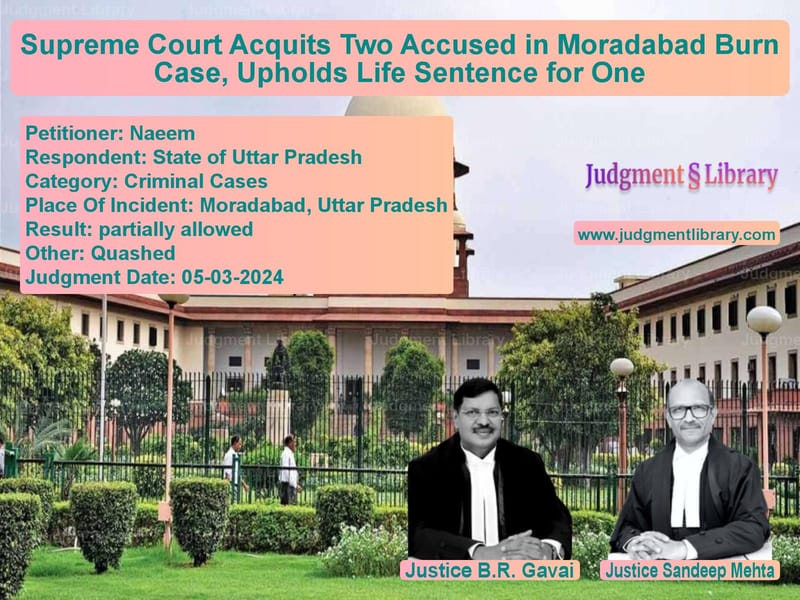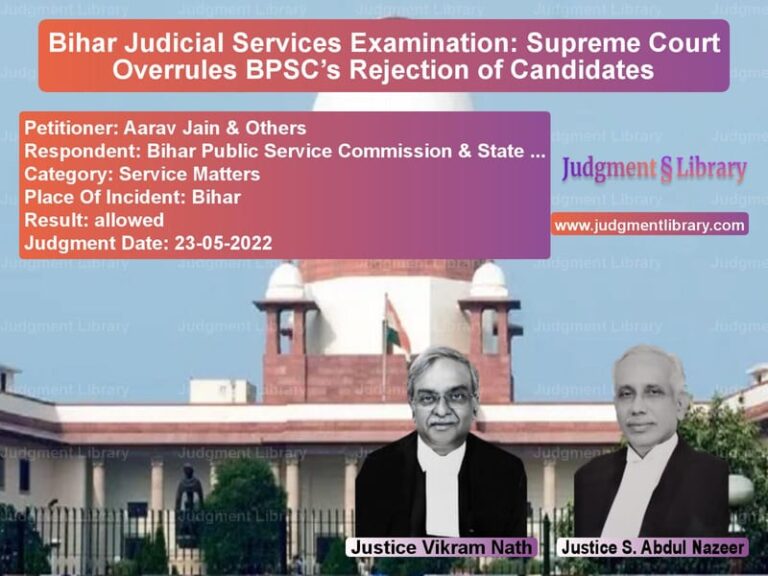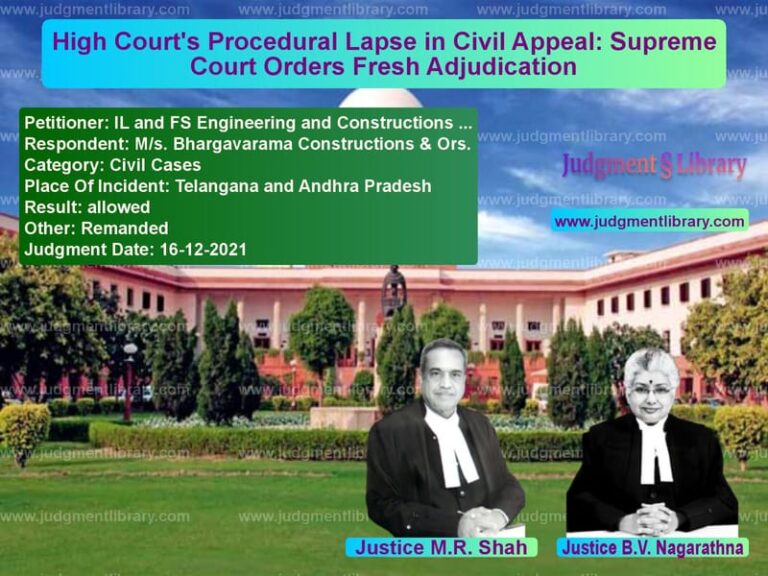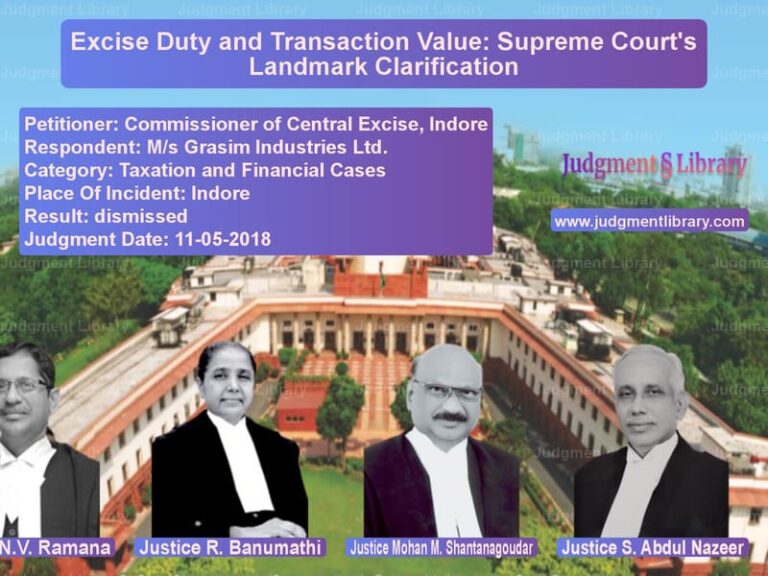Supreme Court Acquits Two Accused in Moradabad Burn Case, Upholds Life Sentence for One
The Supreme Court of India has delivered a crucial judgment in the case of Naeem vs. State of Uttar Pradesh, concerning the tragic immolation of Shahin Parveen. The Court upheld the life sentence of Pappi @ Mashkoor but acquitted Naeema and Naeem, citing lack of specific involvement in the crime. The ruling is a significant decision on the evidentiary value of dying declarations in criminal cases.
Background of the Case
The case revolves around the tragic death of Shahin Parveen, who was set ablaze in her home in Moradabad, Uttar Pradesh, on December 1, 2016. She succumbed to her injuries at Safdarjung Hospital, New Delhi, a day later. The prosecution alleged that the accused, Pappi @ Mashkoor (her brother-in-law), his wife Naeema, and Naeema’s brother Naeem, had been pressuring Shahin to engage in immoral trafficking and, when she resisted, set her on fire.
Following her death, the case was converted from Section 307 IPC (attempt to murder) to Section 302 IPC (murder). The Sessions Court convicted all three accused and sentenced them to life imprisonment. The Allahabad High Court upheld the verdict, leading to an appeal in the Supreme Court.
Read also: https://judgmentlibrary.com/supreme-court-rejects-juvenility-claim-in-1982-murder-conviction/
Key Legal Issues
- Whether the dying declaration of the victim could be relied upon as the sole evidence for conviction.
- Whether all three accused had an equal role in the crime.
- Whether the courts below correctly analyzed the evidence, especially regarding the involvement of Naeema and Naeem.
Arguments by the Appellants (Naeem and Naeema)
The defense, led by Advocate Mohd. Adeel Siddiqui, argued that:
- The dying declaration recorded by the Naib Tehsildar was unreliable due to contradictions and timing issues.
- There was no specific role attributed to Naeema and Naeem; the victim’s statement only mentioned that they had “aided” Pappi @ Mashkoor.
- The conviction was solely based on the dying declaration, which should have been corroborated with other evidence.
- The victim was discharged from the hospital earlier in the day, raising doubts about the authenticity of the recorded statement.
Arguments by the Respondent (State of Uttar Pradesh)
The State, represented by Additional Advocate General Sharan Thakur, contended that:
- The dying declaration was voluntarily given and was properly recorded by an authorized official.
- The victim specifically named Pappi @ Mashkoor as the one who poured kerosene and set her ablaze.
- There was no proof that the victim was unconscious or incapable of giving a statement.
- The presence of Naeema and Naeem at the scene indicated their involvement.
Supreme Court’s Observations and Judgment
1. Reliability of the Dying Declaration
The Supreme Court held that dying declarations can be the sole basis for conviction if they inspire confidence. It stated:
“Dying declaration can be the sole basis of conviction if it inspires the full confidence of the court. The court should be satisfied that the deceased was in a fit state of mind at the time of making the statement.”
2. Role of Pappi @ Mashkoor
The Court upheld the conviction of Pappi @ Mashkoor, emphasizing that he was directly named as the one who set the victim on fire. The ruling stated:
“The victim explicitly stated that her brother-in-law poured kerosene on her and set her ablaze over a dispute regarding house partition.”
3. Acquittal of Naeema and Naeem
The Court ruled that the statement against Naeema and Naeem lacked specificity. While the victim mentioned that they “aided” Pappi @ Mashkoor, she did not specify how. The Court ruled:
“In the absence of any specific role attributed to accused No. 2 Naeema and accused No. 3 Naeem, they are entitled to the benefit of doubt.”
4. Medical Fitness of the Victim
The Supreme Court noted that the doctor certified the victim’s fitness before and after recording her statement, making the dying declaration reliable. It observed:
“The material placed on record reveals that the deceased was in a fit state of mind at the time of making the statement and that it was not the result of tutoring, prompting or imagination.”
5. Final Ruling
The Supreme Court issued the following orders:
- Pappi @ Mashkoor’s life sentence was upheld.
- Naeema and Naeem were acquitted.
- Their conviction and sentence were quashed, and they were ordered to be released immediately if not required in any other case.
Implications of the Judgment
This ruling has several legal implications:
- Reinforces the evidentiary value of dying declarations: Courts can convict based solely on a dying declaration if it is clear and voluntary.
- Clarifies the burden of proof: Accused persons must be individually proven guilty beyond reasonable doubt.
- Limits blanket convictions: Courts must distinguish between principal offenders and those merely present at the scene.
- Strengthens procedural safeguards: Reaffirms the need for medical certification before accepting dying declarations.
The judgment ensures that while justice is served to the guilty, individuals with no proven role in a crime are not unfairly punished.
Petitioner Name: Naeem.Respondent Name: State of Uttar Pradesh.Judgment By: Justice B.R. Gavai, Justice Sandeep Mehta.Place Of Incident: Moradabad, Uttar Pradesh.Judgment Date: 05-03-2024.
Don’t miss out on the full details! Download the complete judgment in PDF format below and gain valuable insights instantly!
Download Judgment: naeem-vs-state-of-uttar-prade-supreme-court-of-india-judgment-dated-05-03-2024.pdf
Directly Download Judgment: Directly download this Judgment
See all petitions in Murder Cases
See all petitions in Attempt to Murder Cases
See all petitions in Judgment by B R Gavai
See all petitions in Judgment by Sandeep Mehta
See all petitions in partially allowed
See all petitions in Quashed
See all petitions in supreme court of India judgments March 2024
See all petitions in 2024 judgments
See all posts in Criminal Cases Category
See all allowed petitions in Criminal Cases Category
See all Dismissed petitions in Criminal Cases Category
See all partially allowed petitions in Criminal Cases Category







